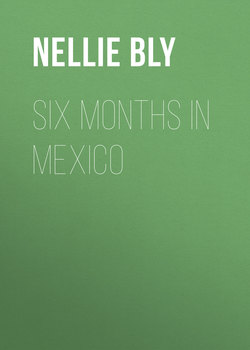Читать книгу Six Months in Mexico - Nellie Bly - Страница 4
CHAPTER IV.
THE CITY OF MEXICO
Оглавление"The City of Mexico," they had called. We got off, but we saw no city. We soon learned that the train did not go further, and that we would have to take a carriage to convey us the rest of the way.
Carriages lined the entrance to the station, and the cab men were, apparently from their actions, just like those of the States. When they procure a permit for a carriage in Mexico, it is graded and marked. A first-class carriage carries a white flag, a second-class a blue flag, and a third-class a red flag. The prices are respectively, per hour: one dollar, seventy-five cents, and fifty cents. This is meant for a protection to travelers, but the drivers are very cunning. Often at night they will remove the flag and charge double prices, but they can be punished for it.
We soon arrived at the Hotel Yturbide, and were assigned rooms by the affable clerk. The hotel was once the home of the Emperor Yturbide. It is a large building of the Mexican style. The entrance takes one into a large, open court or square. All the rooms are arranged around this court, opening out into a circle of balconies.
The lowest floor in Mexico is the cheapest. The higher up one goes the higher they find the price. The reason of this is that at the top one escapes any possible dampness, and can get the light and sun.
Our room had a red brick floor. It was large, but had no ventilation except the glass doors which opened onto the balcony. There was a little iron cot in each corner of the room, a table, washstand, and wardrobe.
It all looked so miserable – like a prisoner's cell – that I began to wish I was at home.
At dinner we had quite a time trying to understand the waiter and to make him understand us. The food we thought wretched, and, as our lunch basket was long since emptied, we felt a longing for some United States eatables.
I found we could not learn much about Mexican life by living at the hotels, so the first thing was to find some one who could speak English, and through them obtain boarding in a private family. It was rather difficult, but I succeeded, and I was glad to exchange quarters.
The City of Mexico makes many bright promises for the future. As a winter resort, as a summer resort, a city for men to accumulate fortunes; a paradise for students, for artists; a rich field for the hunter of the curious, the beautiful, and the rare. Its bright future cannot be far distant.
Already its wonders are related to the enterprizing people of other climes, who are making prospective tours through the land that held cities even at the time of the discovery of America.
Mexico looks the same all over; every white street terminates at the foot of a snow-capped mountain, look which way you will. The streets are named very strangely and prove quite a torment to strangers. Every block or square is named separately.
The most prominent street is the easiest to remember, and even it is peculiar. It is called the street of San Francisco, and the first block is designated as first San Francisco, the second as second San Francisco, and so on the entire street.
One continually sees poverty and wealth side by side in Mexico, and they don't turn up their noses at each other either; the half-clad Indian has as much room on the Fifth Avenue of Mexico as the millionaire's wife – not but what that land, as this, bows to wealth.
Policemen occupy the center of the street at every termination of a block, reminding one, as they look down the streets, of so many posts. They wear white caps with numbers on, blue suits, and nickel buttons. A mace now takes the place of the sword of former days. At night they don an overcoat and hood, which makes them look just like the pictures of veiled knights. Red lanterns are left in the street where the policemen stood during the daytime, while they retire to some doorway where, it is said, they sleep as soundly as their brethren in the States.
Every hour they blow a whistle like those used by street car drivers, which is answered by those on the next posts. Thus they know all is well. In small towns they call out the time of night, ending up with tiempo serono (all serene), from which the Mexican youth, with some mischievous Yankeeism, have named them Seronos.
